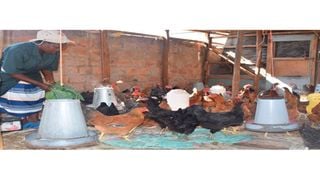
Anne Okelo tends to her chickens at Kenya-Re Estate, Kisumu County.
Seeds of Gold
Premium
The joy and pain of keeping poultry in an urban area
What you need to know:
- Anne Okelo has been an urban poultry farmer for eight years.
- During this time, she has seen the worst and the best of poultry farming.
Inside her 9m by 4m poultry house in Kenya-Re estate in Kisumu, Anne Okelo keeps 110 Kuroiler birds.
Before last year’s festive season, she had over 200 birds but she sold the rest during the festive season at Sh1,000 each.
For eight years, Anne has kept chickens, mastering the art as she learns from her mistakes and challenges in the industry.
“In my flock, some 100 are hens while the rest are cockerels. The recommended ratio is usually 10 hens per cock,” says the 45-year-old.
Her interest in poultry keeping started when working with farmers to help increase their income and fight climate change, says the conservation and livelihoods officer at Lake Victoria Basin Commission.
“I loved farming all along but working with farmers opened my eyes. I went into poultry keeping in 2014 after being challenged to start my project,” she says.
She started with a capital of Sh80,000 drawn from her savings.
“I bought 500 Kenchic day-old chicks at Sh40 each, feeds and build a house for them. The birds were broilers and I sold each after about a month to hotels at between Sh350 and Sh380.”
Until the Covid-19 pandemic started, she was keeping the broiler birds, with the number rising to 500, pocketing up to Sh50,000 a month.
Poultry diseases
However, when hotels were closed due to the pandemic, she shut the broiler business for lack of immediate market.
“I resumed in September last year but chose to keep Kuroilers because they have longevity. Further, they offer eggs and one can sell them for meat later. I bought 300 day-old Kuroiler F1 chicks from Nairobi at Sh110 each.”
It is important to identify a credible supplier for quality chicks, which can grow faster and give good returns, she notes.
“There are many unscrupulous suppliers who sell chicks that have stunted growth and are prone to diseases.”
She broods chicks for farmers for three weeks at Sh140 each. She offers her birds commercial feeds and supplements with greens like sukuma wiki.
“Poultry diseases become a problem if high standards of hygiene are not observed. Besides hygiene, proper ventilation is necessary as well as one maintaining a sizeable flock,” says Anne, who at one time lost 480 out of 500 birds to coccidiosis due to congestion.
Limiting the number of people visiting the poultry structure also helps control the spread of diseases.
Cold storage system
“The good thing about urban poultry keeping is that there is a huge market but there is a challenge of space and high cost of feeds since the birds can’t free-range to cut costs,” she says, adding still one has to do market research and plan well so that if they are keeping broilers, the birds are disposed of faster.
She advises one should also have a cold storage system for the slaughtered chickens so that they don’t go bad.
Besides coccidiosis, other diseases she grapples with are fowl typhoid, Gumboro and New Castle.
Dr Denis Mujibi, a senior researcher in animal science and the CEO of Usomi Agriculture Limited, says chickens ought to be vaccinated against poultry diseases as scheduled.
"However, the best health management programme is to ensure there is proper bio-security so that you minimise the chances of infection or spread of diseases between flocks."
He adds that one should engage a vet who can regularly visit the farm to help with early detection of disease.
“However, do not be quick to use antibiotics for treatment unless absolutely necessary."
In the next five years, Akelo hopes to run a poultry training centre for farmers.





